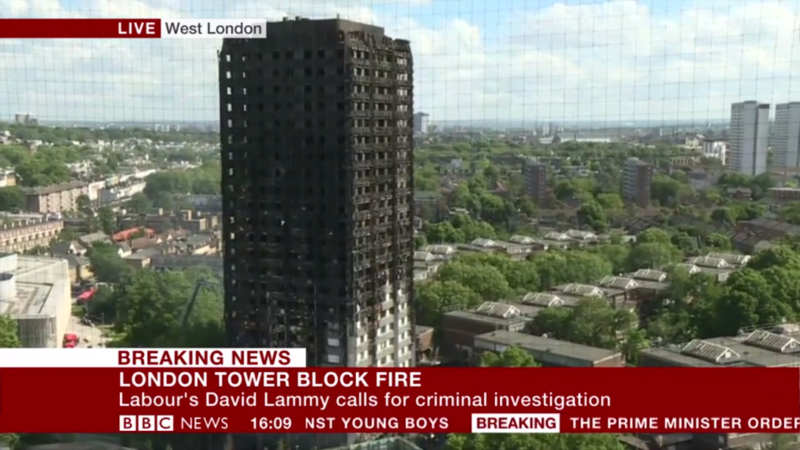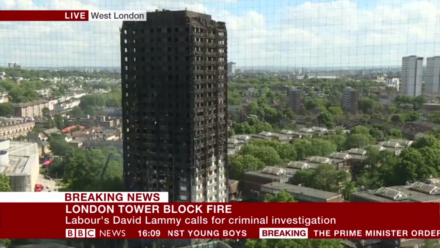

Dear Prime Minister,
I am writing to set out our response to your consultation on the terms of reference for the inquiry into the fire at Grenfell Tower.
I strongly welcomed your promise that “no stone will be left unturned in this inquiry”, and what follows is our assessment of how to ensure that promise is fulfilled. As stated in earlier correspondence, we believe that the interests of both Grenfell Tower residents and the general public would be best served by a two stage inquiry, the first into the specific circumstances around the Grenfell Tower fire and the second into its national implications.
Stage one of the inquiry should focus on residents’ urgent questions about what happened at Grenfell Tower itself, specifically to establish:
- What started the fire;
- Why it spread so rapidly and whether building regulations were contravened;
- Why residents’ complaints about the condition of the building’s fire safety features were repeatedly ignored;
- The priorities informing the Royal Borough of Kensington and Chelsea’s funding and administrative decisions and what impact, if any, they had on the circumstances surrounding the fire;
- The soundness or otherwise of the advice given to residents during the fire;
- The support and advice given to those affected in relation to housing, mental health, benefits and immigration status after the incident and how effectively it was communicated and administered by the council, the tenant management organisation, task forces, central government and any other relevant organisations,
- Whether survivors have been treated reasonably and with due consideration since the tragedy;
- The nature of and reason for any constraints on the emergency service response to the fire;
- Whether existing building regulations are sufficiently clear, up-to-date and strong.
In addition, the early part of the public inquiry should examine what happened at Grenfell Tower in relation to the points of concern raised by the coroners in rule 43 letters to the government in 2013, namely: building regulations, the retrofitting of sprinklers, and advice and information to residents. Any early assessment of such aspects in light of the Grenfell Tower fire will enable necessary work to be started early rather than be delayed until after the final inquiry report.
There is widespread recognition that Grenfell Tower residents and victims’ families deserve rapid answers to these questions, and that any undue delay risks adding to the intolerable levels of suffering they have already experienced. We suggest that stage one of this inquiry seeks to answer these questions in a timely fashion, producing an initial report this summer. Enabling the inquiry to report back rapidly on this specific set of issues would be a major benefit from conducting it in two stages.
However, we are also concerned that the information already in the public domain points to a series of systemic failures that may extend from local to national government and beyond. We would be disrespecting the memory of those who died in the Grenfell Tower fire, and putting further lives at risk, if we fail to fully learn these lessons. It is therefore our view that an immediate inquiry into the proximate causes of the Grenfell Tower fire should be supplemented by a longer-term, more wide-ranging inquiry into the underlying causes of what went wrong and the extent to which they are replicated on a national scale.
Following the successful template of the Macpherson Inquiry, the rubric for this stage should be “an inquiry into matters arising from the Grenfell Tower fire”, that is broad enough to allow the inquiry to follow different avenues as and when they become relevant and appropriate. We anticipate that the issues covered would include, without being limited to, the following:
- The adequacy or otherwise of existing building regulations and their enforcement;
- Housing allocation policy;
- Levels of funding for local councils, housing associations and the fire service and its impact on the quality and quantity of services they are able to deliver;
- The use of outsourcing and subcontracting to deliver local government and housing responsibilities, including how widespread it is, why, and its impact on standards and accountability;
- The responsiveness of TMOs and councils to their tenants.
Finally, it is important to note that effective inquiries command confidence because of both what they examine and how they are conducted. With this in mind, I urge you to consider broadening the inquiry team to a model more similar to that used in the McPherson Inquiry, including with representation from those from minority backgrounds, in order to support the judge leading this inquiry. In addition to the stated responsibilities to set out the terms of reference, the Inquiries Act 2005 outlines the responsibilities that government ministers have in making such appointments.
The importance of residents and victims’ families having full confidence in this inquiry cannot be underestimated. As your own justice secretary recognised when he told Radio 4’s Law in Action programme on 27 June: “after the experience with the Hillsborough families it’s really important to make sure those who have been absolutely traumatically affected by this disaster have utter confidence that the inquiry will get to the truth”. Yet, as you will be aware, for a number of residents this confidence has so far been lacking. Choosing one of the options at your disposal to introduce a range of perspectives and experiences into the inquiry will help to both build trust and deliver justice.
As I set out in my letter dated 30 June, there is considerable concern among residents and others that the judge leading the inquiry has already been directed towards a narrowly defined terms of reference, which will not bring residents the answers they seek. I therefore urge you to give our suggestions in this letter the fullest consideration.
Given the importance of these issues, this letter will be made public.
Yours sincerely,
Jeremy Corbyn MP
Leader of the Opposition




More from LabourList
Almost half of Labour members oppose plans to restrict jury trials, poll finds
‘How Labour can finally fix Britain’s 5G problem’
‘The University of the Air – celebrating 60 years of Harold Wilson and Jennie Lee’s vision’